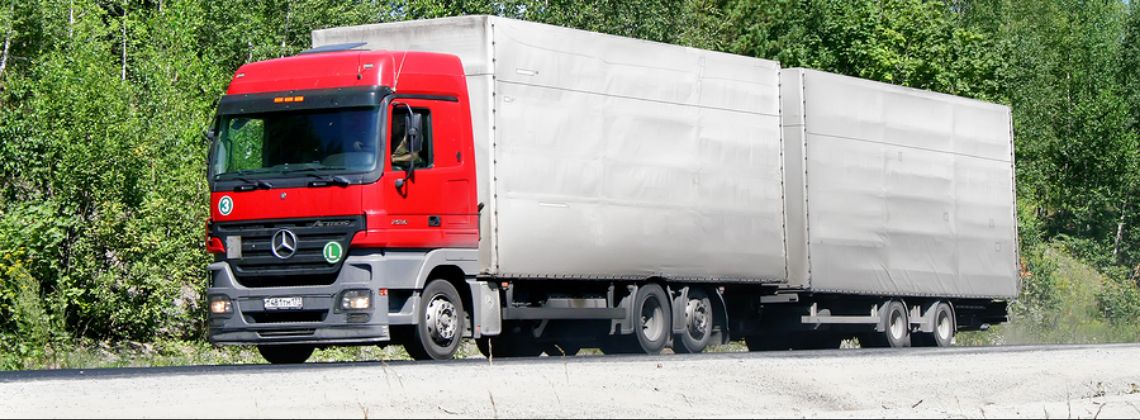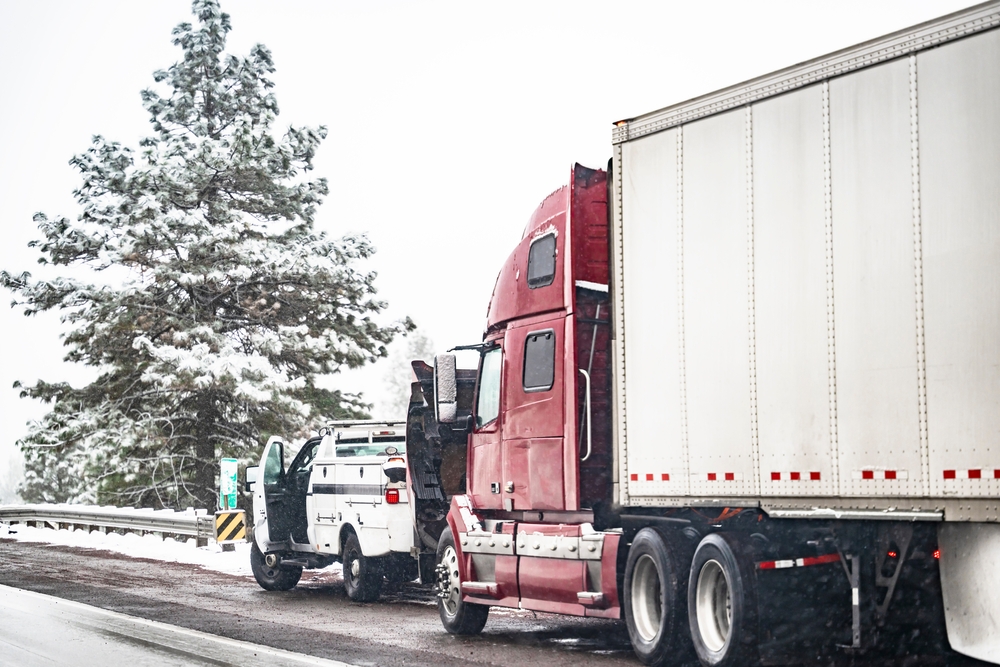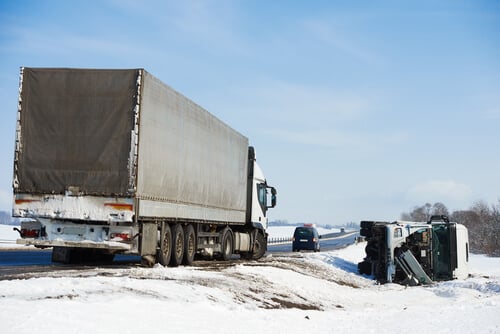How Wide Is a Semi-Trailer?

The Federal Highway Administration (FHWA) lists the maximum semi-trailer width as 102 inches or 8.5 feet. Most semi-trucks that you encounter on the road are no more than 102 inches wide. Regulators have determined that this is the width at which a truck driver can safely occupy their lane.
While some trailers or loads can exceed 102 inches wide, those responsible for those trailers or loads must take additional precautions.
A large semi-trailer can cause devastating accidents and injuries. If you were injured in a crash, contact an Atlanta truck accident attorney from Spaulding Injury Law: Personal Injury & Car Accident Lawyer today.
Precautions Freight Carriers Must Take If a Trailer (or Load) Exceeds 102 Inches
The FHWA notes that states issue permits for loads or vehicles that exceed the maximum width of 102 inches. States may issue permits for vehicles or loads that cannot be divided into multiple vehicles (such as a portable building).
In addition to obtaining all necessary permits, those responsible for an oversized load may need one or more escorts to accompany the hauling vehicle. If a freight carrier or driver transports a large trailer or load without proper permitting or precautions, they act negligently (and likely illegally).
What Is the Maximum Weight That a Semi-Trailer Can Carry?
Just as semi-trailers must comply with maximum width limits, they must also fall under a maximum weight limit. The Code of Federal Regulations (CFR) § 658.17 caps the “maximum gross vehicle weight” at 80,000 pounds. While oversized loads may exceed this weight, transporters must obtain all necessary permits.
Even light-duty trucks may weigh more than 6,000 pounds. Passenger vehicles generally weigh only a few thousand pounds. Eighty thousand pounds is a massive, dangerous load.
Trucking companies and truck drivers must be most cautious when transporting any load. However, loads approaching the maximum weight limit present a massive danger to others on the road.
Why Are Size and Weight Limitations Important for Freight Haulers?
Size and weight limitations exist in the name of safety. A trailer or load that is too wide or heavy poses an unacceptable danger to motorists and pedestrians near the roadway. Only in rare cases can a trailer or load exceed size and weight limits—this caution is warranted.
The Dangers of Overly Wide Trailers and Loads
The width of road lanes varies. Even the widest lanes, though, are unsafe for trailers exceeding 102 inches in width. Transportation regulators have determined that any trailer wider than 102 inches would pose a risk to motorists in neighboring lanes.
A trailer that is wider than 102 inches may:
- Require the truck driver to exercise an unrealistic degree of precision, meaning that a single mistake could cause a truck accident.
- Cross lane divisions, striking a vehicle in another lane
- Cause other motorists to leave their own lane in order to avoid striking the oversized trailer.
Anyone who has passed an oversized load on a roadway knows the danger that these wide loads pose. A motorist must be able to travel in their own lane comfortably, and overly wide loads prevent this.
A wide load may also be dangerous for the truck driver. If another vehicle strikes the trailer or the truck clips another vehicle or structure, the truck driver could be seriously injured.
The Dangers of Overly Heavy Loads
An overloaded semi-trailer poses several risks, including:
- A flipping hazard: When light vehicles turn a corner, they have little risk of overturning. Because they aren’t carrying a heavy load, a smaller vehicle can change direction without its momentum becoming a hazard. When an immensely heavy load is traveling in one direction and takes a sharp turn, the momentum can cause the trailer to flip.
- The collapse of infrastructure: While overpasses, bridges, and other infrastructure should be able to sustain more than 80,000 pounds of weight, overloaded trailers may pose a risk of destroying infrastructure. Over time, heavy vehicles take a toll on roads and bridges.
- Crushing force: When a truck weighing tens of thousands of pounds strikes a smaller, lighter vehicle, there is already a great risk of serious injury and death. When a load exceeds 80,000 pounds, its crushing force is unstoppable.
Federal and state-level weight limits are not random. Regulators and transportation industry experts have chosen the 80,000-pound weight limit for a good reason. Trucking companies or individuals who exceed these weight limits—knowingly or not—put others in grave danger.
Who Is Liable If an Overloaded or Overly Wide Semi-Trailer Contributes to an Accident?
Liability for an overloaded or oversized trailer accident may fall upon one or multiple parties, including:
- A trucking company: A trucking company may be the most likely defendant in a truck accident case. These companies have responsibility for every trailer they put on the road, with few exceptions.
- The company that loaded cargo: Cargo loaders are generally required to ensure that cargo meets all weight requirements. Loaders must also distribute cargo across axles in a specific way, as uneven cargo could contribute to an accident.
- A truck driver: Truck drivers must generally ensure that their cargo is loaded and distributed properly. If cargo is not loaded in a safe manner, a driver must typically return to the loading bay rather than proceeding to their offloading destination.
The details of each truck accident vary. A truck accident lawyer from Spaulding Injury Law will investigate your accident. By getting all relevant witness accounts and evidence, we will determine liability for your collision.
Types of Negligence That May Allow an Oversized or Overloaded Trailer on the Road
Trucking companies and cargo loaders should have several systems to prevent dangerous trailers and cargo from entering the roadway. Failures that may lead to a truck accident include:
- Hiring under-qualified employees
- Hiring employees with a history of behavioral misconduct, substance misuse, or other red-flag behaviors
- Failing to monitor employees
- Failing to discipline (and perhaps terminate) employees who disregard safety
- Failing to provide comprehensive, up-to-date technologies for measuring cargo weight
- Disregarding industry regulations
Often, truck drivers are at their employers’ mercy. If an employer sets a standard of carelessness and negligence, employees may follow. This is one reason why we typically seek compensation from trucking companies when an employee causes an accident.
Regulations governing the trucking industry are complex. So is the process of completing a truck accident claim or lawsuit. Rather than risking your health and well-being, allow the dedicated lawyers at Spaulding Injury Law to fight for the money you deserve.
What Should the Victim of a Semi-Truck Accident Do After Their Collision?
Ensuring your health and safety is paramount. If you have yet to receive a thorough medical exam or significant time has passed since you’ve seen a doctor, get medical care as soon as possible.
Even if you feel physically fine, getting comprehensive medical care will:
- Allow a doctor to monitor the state of your injuries as you recover
- Ensure that your recovery is progressing normally
- Ensure your treatment plan is effective
- Protect you from further injury or health complications
- Provide you crucial documentation to use in a claim or lawsuit
Truck accidents can cause life-threatening injuries. Some injury symptoms are slow to emerge, while others may cause lingering health problems. For most truck accident victims, getting medical care once will not be enough.
Hire a Lawyer as Soon as Possible After Your Truck Accident
Hiring an experienced lawyer should also be a priority after a truck accident. We recommend that you hire your attorney from Spaulding Injury Law, a firm with more than 25 years of experience.
You should hire a lawyer from our team as soon as possible because:
- We may face a deadline for filing your case, and missing that deadline could be financially catastrophic for you.
- Insurance companies may pressure you to make statements or accept an unfair settlement offer, and we’ll protect you from those companies.
- We want to gather evidence as quickly as possible.
- We want to record witness accounts before they fade.
Time is of the essence when seeking justice for a truck accident. Let us go to work for you.
How Does a Truck Accident Lawyer from Spaulding Injury Law Help Their Clients?
The Spaulding Injury Law team will lead every step in your case. From investigating the collision to preserving evidence, seeking a settlement, and completing a trial (if necessary), we provide end-to-end representation.
Our Firm Will Seek Compensation for These Damages After Your Truck Accident
In non-fatal truck accident cases, we typically seek compensation for the following:
- Property damage
- Medical expenses
- Professional damages (including lost income)
- Pain and suffering
- Any counseling, medication, or other treatment the client needs for their pain and suffering
- Any other damages the client has suffered because of their truck accident
We also represent clients who’ve lost loved ones in fatal truck accidents. In these heartbreaking cases, we may seek compensation for:
- Funeral expenses
- Grief counseling
- Loss of consortium
- Lost financial support
- All other damages from the accident and wrongful death
Our legal services from our Lawrenceville truck accident lawyer meet your needs.
Call Our Truck Accident Lawyer Today for Your Free Consultation
A semi-truck accident lawyer from Spaulding Injury Law is ready to start your case today. We require no upfront compensation, and our team does not receive a fee unless we win for you.
Call Spaulding Injury Law: Atlanta Personal Injury & Car Accident Lawyer today at (770) 744-0890 for your free consultation. You can also contact us online.

When you become our client at Spaulding Injury Law, you’ll be represented by a thoroughly experienced Atlanta personal injury attorney like Theodore A. Spaulding. For over 15 years, Mr. Spaulding has helped victims of negligence across the state of Georgia resolve personal injury cases, and he’s received a remarkable number of awards and honors from the legal community recognizing his commitment to clients and to the metro-Atlanta area.
Mr. Spaulding has been named one of the Top 100 trial lawyers in Georgia by the National Trial Lawyers for six successive years.
He is honored as a lifetime member of the Million Dollar Advocates Forum ® by the Top Trial Lawyers in America ®.
Charter Member of the Distinguished Justice Advocates.
Member of the Atlanta Bar Association.




















